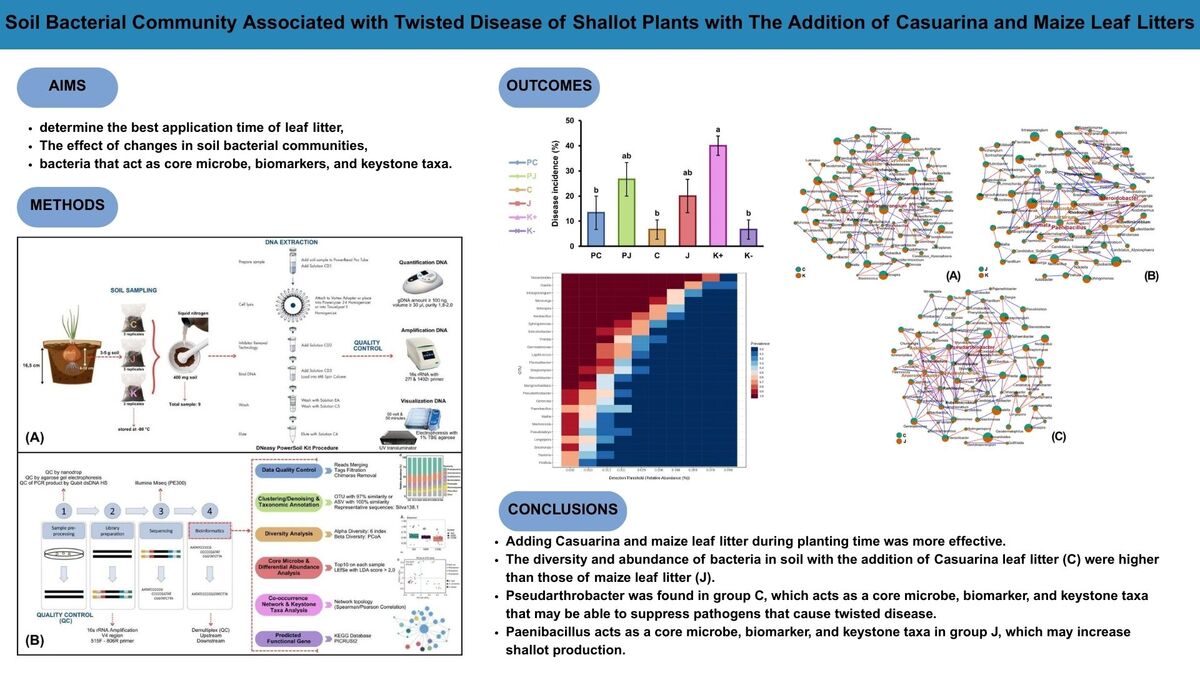ORIGINAL ARTICLE
Soil Bacterial Community Associated with Twisted Disease of Shallot Plants with The Addition of Casuarina and Maize Leaf Litters
1
Department of Plant Protection, Faculty of Agriculture, Universitas Gadjah Mada, Jl. Flora, 55281, Yogyakarta, Indonesia
2
2School of Agriculture and Food Sciences Faculty of Science, University of Queensland, South Wing, Keyhole Rd, St Lucia, 4067, Brisbane, Australia
A - Research concept and design; B - Collection and/or assembly of data; C - Data analysis and interpretation; D - Writing the article; E - Critical revision of the article; F - Final approval of article
Submission date: 2025-03-20
Acceptance date: 2025-08-05
Online publication date: 2025-08-26
Corresponding author
Arif Wibowo
Department of Plant Protection, Faculty of Agriculture, Universitas Gadjah Mada, Jl. Flora, 55281, Yogyakarta, Indonesia
Department of Plant Protection, Faculty of Agriculture, Universitas Gadjah Mada, Jl. Flora, 55281, Yogyakarta, Indonesia
HIGHLIGHTS
- Casuarina leaf litter affects Pseudarthrobacter that suppress twisted disease
- Maize leaf litter affects Paenibacillus that increase shallot production
- Addition of leaf litter during planting more effective than before planting
KEYWORDS
application time16s rRNA amplicon metagenomiccore microbekeystone taxaPaenibacillus Pseudarthrobacter
TOPICS
ABSTRACT
Twisted disease caused by Fusarium is one of the causes of the decline in shallot production in Indonesia. Disease management by adding Casuarina leaf litter and maize leaf litter during planting time has suppressed twisted disease incidence and increased shallot production in previous studies. Bacterial communities can influence disease suppression and increase plant production in soil. However, the effect of adding Casuarina and maize leaf litter on the soil bacterial community, and its impact on suppressing twisted disease is still unknown in shallot planting. In addition, no further studies have been conducted on the effectiveness of the application time of Casuarina and maize leaf litter. This study aimed to determine the best application time of leaf litter in suppressing twisted disease, the effect of changes in soil bacterial communities, and bacteria that act as core microbe, biomarkers, and keystone taxa. Results showed that adding Casuarina and maize leaf litter during planting time was more effective than adding Casuarina and maize leaf litter two weeks before planting. The diversity and abundance of bacteria in soil with the addition of Casuarina leaf litter (C) were higher than those of maize leaf litter (J). In addition, Pseudarthrobacter was found in group C, which acts as a core microbe, biomarker, and keystone taxa that may be able to suppress pathogens that cause twisted disease. Paenibacillus acts as a core microbe, biomarker, and keystone taxa in group J, which may increase shallot production. This study's results will help develop effective twisted disease management strategies to control disease development.
CONFLICT OF INTEREST
The authors have declared that no conflict of interests exist.
We process personal data collected when visiting the website. The function of obtaining information about users and their behavior is carried out by voluntarily entered information in forms and saving cookies in end devices. Data, including cookies, are used to provide services, improve the user experience and to analyze the traffic in accordance with the Privacy policy. Data are also collected and processed by Google Analytics tool (more).
You can change cookies settings in your browser. Restricted use of cookies in the browser configuration may affect some functionalities of the website.
You can change cookies settings in your browser. Restricted use of cookies in the browser configuration may affect some functionalities of the website.




